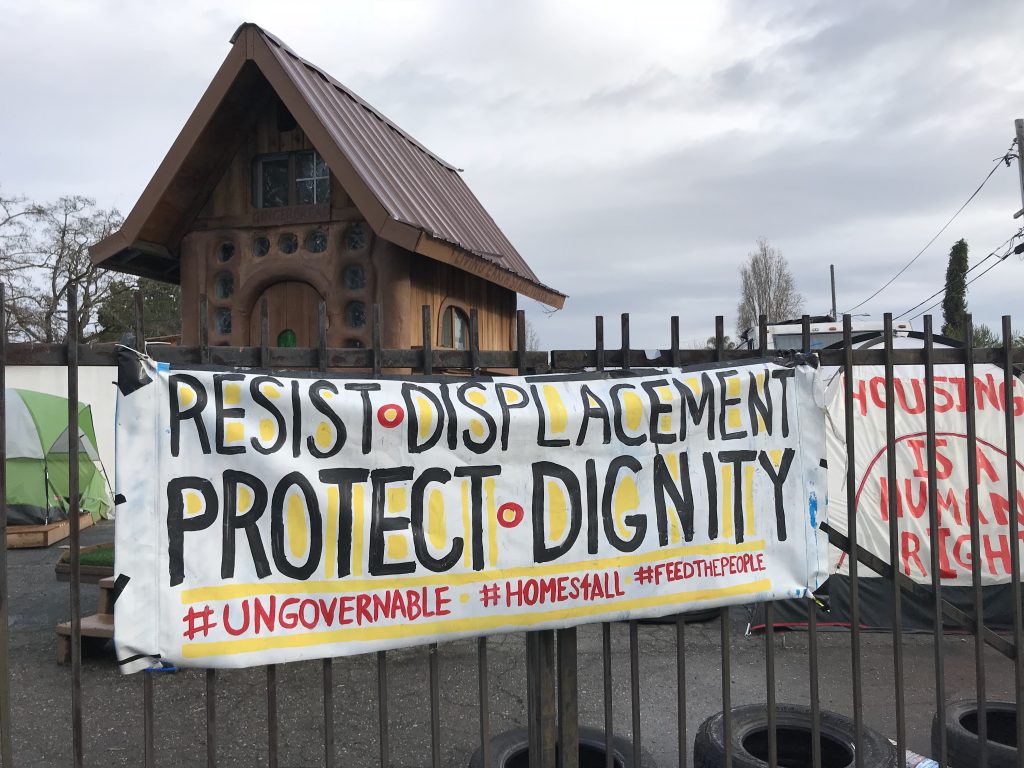
A recent settlement agreement between the City of Oakland and seven unhoused plaintiffs could lead to big changes to the city’s Encampment Management Policy
The City of Oakland has agreed to change the way it closes homeless encampments, settling a lawsuit filed in 2018 by seven unhoused plaintiffs of the Housing and Dignity Village (HDV) encampment community.The settlement will enact several meaningful changes to the city’s Encampment Management Policy.
Currently, the city is required to give encampment residents 72 hours’ notice before a sweep. Now, they will need to give a full week’s warning, including detailed plans and contact information for service providers. City workers will also be required to follow strict protocols for collecting, storing, and keeping track of personal posessions taken during sweeps, and make those items available for pickup within 48 hours. The settlement also outlines new policies around extreme weather: It says that the city cannot begin encampment closures in the rain, during weather that exceeds 90 degrees or dips below 42, and when air pollution levels are above 200 AQI.
Under the settlement agreement, the City of Oakland will also pay $250,000 to former HDV residents.
Housing and Dignity Village was an encampment community formed by unhoused women and children in 2018. For three months, residents lived in tents and tiny homes on a vacant, city-owned lot at the intersection of S. Elmhurst and Edes Avenues in deep East Oakland. When the encampment was posted for eviction in November, seven HDV residents sued the city in federal court in an effort to stop the closure, but were unsuccessful. The city posted a closure notice for December, but residents were surprised when dozens of city workers and police officers showed up early one morning to evict them. They say city officials had agreed to postpone the sweep until after a community meeting—a claim the city denies.
“For now, our home base is the street outside of the gates where the Housing and Dignity Village was. We are a community, a family, a unit. The bonds we have created are like the frame and rafters of a home. They can’t crush and destroy that,” Needa Bee wrote the day after the sweep, for a piece that was published in the January 2019 Street Spirit.
The plaintiffs updated their lawsuit after the eviction took place, noting that the city had agreed to postpone the sweep. They also argued that the city failed to offer residents adequate alternative shelter—ahead of the sweep, they were offered one-night stays at congregate shelters where they would not be able to bring their posessions or pets. This is the lawsuit that resulted in a settlement last month.
Though the Oakland City Council voted to approve the settlement in early August, the plaintiffs have not yet signed the agreement. Additionally, though Council President Nikki Fortunato Bas said the policy changes would take effect immediately upon the council’s vote, the new changes were not implemented in encampment sweeps this month. It is unclear whether or not this is because the plaintiffs have yet to submit their approval.
The policy changes outlined in this settlement will provide a significant change in the lives of unsheltered Oaklanders living in encampments. However, that’s just part of what makes this settlement such a big deal: Once it is signed by the plaintiffs, a federal judge will be the ultimate authority on enforcing these policy changes—a big shift in the structure of the city’s encampment management work.
Alastair Boone is the Director of Street Spirit and a beat reporting fellow for KALW covering homelessness.
